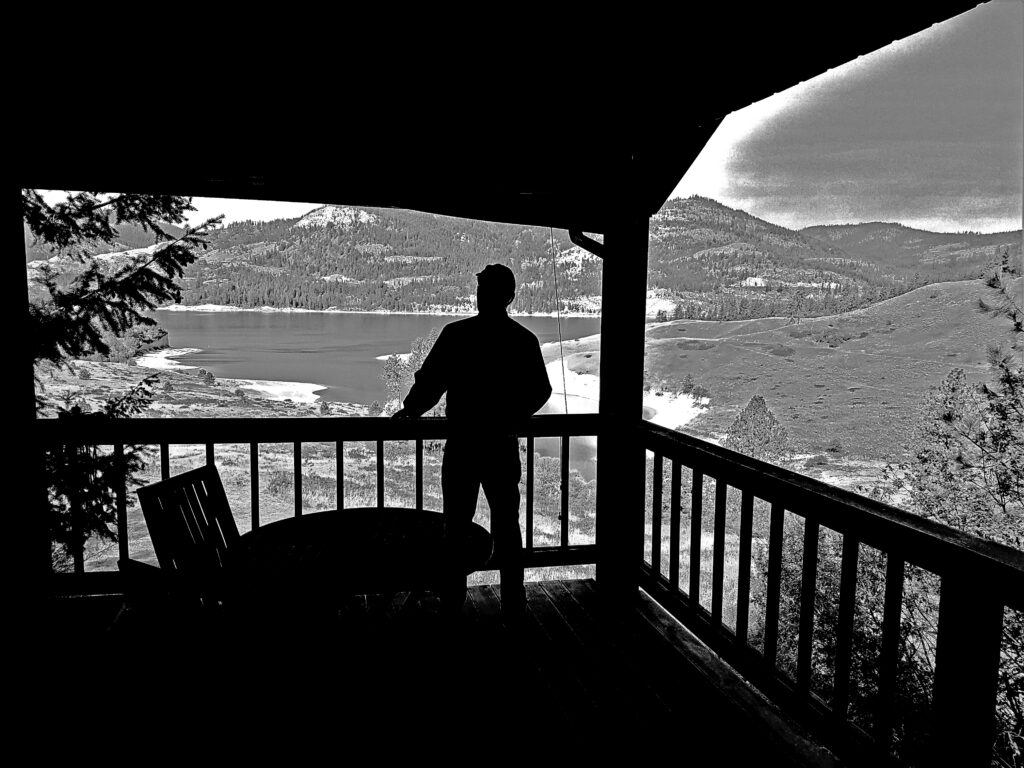By Seán Malone and John Sweetman
Seán and I spent several decades in Ferry County and had a number of adventures, some of which we can tell now that time has passed.
The county is not the largest of the 39 counties of Washington state, but is the most remote, and like Vashon, is basically surrounded by water. Roads are mostly old wagon trail traces. Two (free) ferries serve across a large lake (Roosevelt) behind the Coulee Dam, and the county has the highest passes in the state. Access to Ferry County is either by Sherman Pass at 5,600 feet or Wauconda Pass, about 4,500 feet.
I was the County Assessor and had to traverse remote places, usually by myself, and would occasionally run into pot-growing operations and paranoid Vietnam vets with bad attitudes. Mostly, I got to know the vets as I was in a Veterans of Foreign Wars group that provided some aid, but the squatting pot growers from California were touchy and would occasionally use firearms to defend their operations.
Why anyone ever grew pot on forest service land was a mystery to me, as the Ferry County climate intimidated even kale, and the high country was full of range cattle that could detect anything green in the late August harvest season. No fence could prevent 50 or more range cattle from anything that looked tasty.
At that time, pretty much everyone in the County had some sort of firearm on hand. But the attitude toward firearms was pretty much the same as toward having chains, jacks, come-alongs, fence pliers, and other mere tools. Things that might come in handy.
I had an 1864 Navy black powder “cap” and ball Colt. That thing was too heavy to wear, so I just kept it in an oily bag behind the seat of the old Ford, which Seán owns now. As a “defensive” weapon, the advantages were slight. It propelled a lead ball mostly in the direction where the barrel pointed, but released a dense cloud of smoke, and better yet, fiery sparks of unburned black power.
So, if I ever had to use it, not only would I be hidden from sight, but could hope that whomever it was aimed at would have their hair set on fire.
In all those years, the old Colt only had one sort of unintended casualty. We would run across “slow hens,” which were a particularly tasty grouse that could be knocked off with a rock in late August. I ran across a large one that just sat on a log and taunted me. After tossing a few inaccurately placed rocks, I retrieved the old gun and fired a shot from about 20 feet.
Sure enough, I got him! But I could find no evidence that he was hit, so I was pretty sure he died of fright or merely smoke inhalation. The delicious roast was, however, tinged with faint aromatic sulfur. Later on, I learned that there was such a thing as “grouse season,” and it was not in August.
Seán always had his .30-40 Krag with him. We think that the gun was a veteran of the Spanish-American war. Today, Seán has that gun up on a rafter in the cabin and it serves well as a rod to dry out his socks. I have no idea what happened to my old Navy Colt, and even if I could find it, the barrel was too short for socks.
Seán has a few stories, because we were all over the remote county areas getting wood and staking mining claims:
I looked over the bank on Hardscrabble Road and spotted an acre of rhubarb waiting to be picked. It was an old homestead on what is now national forest. I loaded my pack with rhubarb to take home and can for the next winter. It turned out that the rhubarb was too old and stringy. It wouldn’t be canned, even after adding sugar.
There were abandoned mines on the top of the ridge looking down, a good place to look for crystals and a possible vein of gold. But the mines had been abandoned due to the absence of gold. You couldn’t see over the ridge to Torroda Creek Road, which is where I was headed to take the long way back to Republic, through Waconda.
Little did I know, as I wound my way down from the ridge, what I would run into near the bottom. I stopped on a curve near the bottom. Rifle fire was hissing through the leaves of the trees hanging over the road.
Around the second curve, I came upon three guys on the porch of a small cabin. I made the appropriate accusations regarding the rifle fire, and the person holding the rifle replied that he had been shooting at a coyote, not me.
Since I was living on Trout Creek Road and selling firewood, I knew what was going on. I have a printed log of having cut and sold 3,000 cords over 20 years. I still have a written letter from the Forest Service, of great support, for my service to Ferry County. If I had all that wood, I could cover the town of Republic four feet deep in firewood. Father Morbeck did not tell me my stories would reappear in the months and years ahead.

